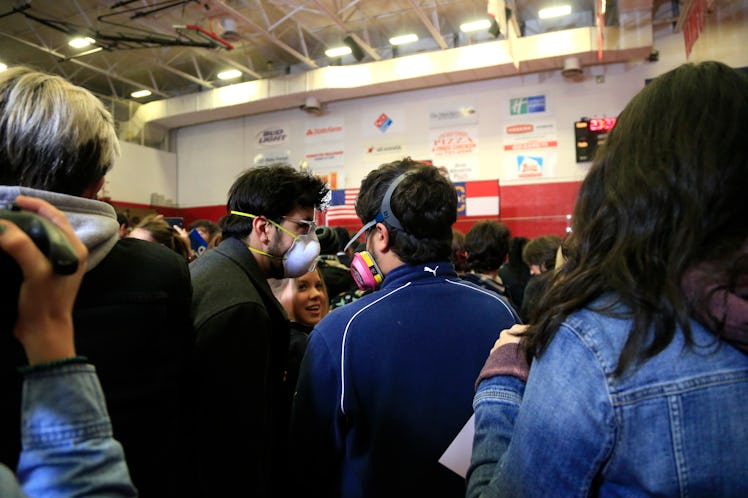
Here's What To Know About What's Going On With Coronavirus
Editor’s Note: On Wednesday, March 11, the World Health Organization (WHO) declared the coronavirus outbreak a pandemic.
As new cases of coronavirus are reported everywhere from California to Italy, people around the world are understandably worried. With so many countries reporting incidences of coronavirus, you might be wondering — is coronavirus a pandemic? After weeks of spread, the World Health Organization (WHO) declared coronavirus a pandemic on March 11.
As of the date of the declaration, an estimated 120,000 cases of coronavirus, also referred to by the name of the illness it causes, COVID-19, had been reported worldwide, according to The New York Times. While the majority of cases are reportedly mild, some 4,300 people have died globally. In the United States, there were more than 1,000 cases as of March 11, and 31 deaths reported. Most of the U.S. cases were clustered in Washington state, New York, and California.
The WHO and the U.S. Centers for Disease Control and Prevention (CDC) had previously resisted describing coronavirus as a pandemic, though in late February the CDC acknowledged the possibility it could become one. As of Feb. 28, the WHO classified COVID-19 as a "global health emergency," while the CDC described it as an "outbreak" or "epidemic."
According to Healthline, an epidemic or outbreak is defined as a sudden increase in cases of a specific illness beyond its baseline or expected level for a certain region. On the other hand, a pandemic is more serious, and is defined as an epidemic that has spread across multiple countries or continents, typically affecting a much larger population. Prior to the spread of coronavirus, the last reported pandemic was the 2009 spread of the H1N1 flu, per CNN, which killed anywhere from 151,700 and 575,400 people around the world.
On Feb. 24, WHO Director-General Tedros Adhanom Ghebreyesus explained the "global health emergency" classification while speaking to reporters in Geneva, noting the organization only applies the classification of "pandemic" to illnesses that see multiple self-sustaining outbreaks in regions around the globe. "For the moment, we are not witnessing the uncontained global spread of this coronavirus, and we are not witnessing large-scale severe disease or death," he said at the time.
It's sometimes difficult for health officials to talk about pandemics because of how pop culture has shaped people's perception of them. From Michael Crichton's The Andromeda Strain to Richard Preston's The Hot Zone, not to mention pretty much every zombie movie ever made, sci-fi books and movies over the years have tackled pandemics in which people around the world suddenly and mysteriously fall ill and die. In reality, an illness like coronavirus — while clearly worrisome — is not a completely mysterious, unknown entity that is going to suddenly kill half the world's population.
According to The New York Times, 80% of the coronavirus cases that have been identified in China are actually pretty mild, similar to a common cold. Citing a Feb. 17 study from the Chinese Center for Disease Control and Prevention, the Times reported that less than 5% of Chinese coronavirus cases were classified as critical, and less than 14% were severe. The mild nature of the illness may make it more difficult to contain coronavirus, per the Times, because many people might not realize they have it — but it also means most people are likely to recover from and even develop immunity to coronavirus.
In the meantime, there are still steps you can take to minimize your chances of being infected. According to the CDC, the precautions you can take are similar to those you should be taking during flu season. You should wash your hands regularly, with the CDC recommending you wash your hands with soap and water for at least 20 seconds after using the bathroom, before eating, and after blowing your nose, coughing, or sneezing. You should also make sure to cover your nose and mouth with a tissue when you sneeze, and avoid touching your eyes, nose, and mouth as much as possible. And of course, stay home from work or school when you’re sick, and drink lots of fluids.
Most importantly, according to The Washington Post, health officials are encouraging people not to panic. There's a lot of misinformation about coronavirus out there, but what's important to remember now is you can take steps to keep yourself safe.
If you think you’re showing symptoms of coronavirus, which include fever, shortness of breath, and cough, call your doctor before going to get tested. If you’re anxious about the virus’s spread in your community, visit the CDC for up-to-date information and resources, or seek out mental health support. You can find all Elite Daily's coverage of coronavirus here.
This article was originally published on